高中作文--吃方便面的坏处
事理说明文作文【精选9篇】
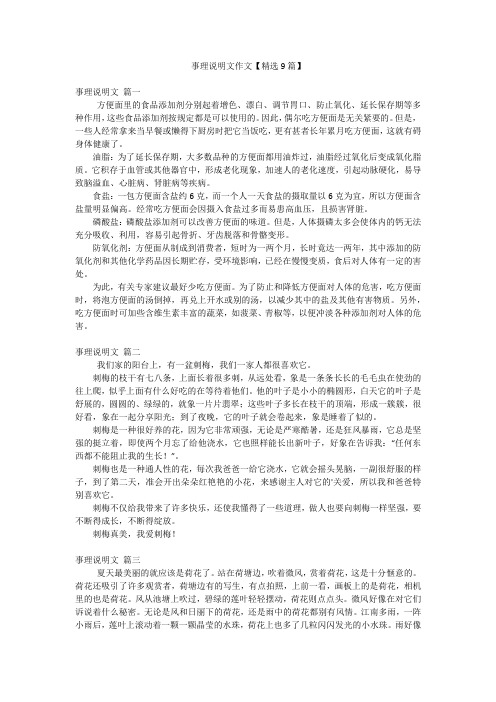
事理说明文作文【精选9篇】事理说明文篇一方便面里的食品添加剂分别起着增色、漂白、调节胃口、防止氧化、延长保存期等多种作用,这些食品添加剂按规定都是可以使用的。
因此,偶尔吃方便面是无关紧要的。
但是,一些人经常拿来当早餐或懒得下厨房时把它当饭吃,更有甚者长年累月吃方便面,这就有碍身体健康了。
油脂:为了延长保存期,大多数品种的方便面都用油炸过,油脂经过氧化后变成氧化脂质。
它积存于血管或其他器官中,形成老化现象,加速人的老化速度,引起动脉硬化,易导致脑溢血、心脏病、肾脏病等疾病。
食盐:一包方便面含盐约6克,而一个人一天食盐的摄取量以6克为宜,所以方便面含盐量明显偏高。
经常吃方便面会因摄入食盐过多而易患高血压,且损害肾脏。
磷酸盐:磷酸盐添加剂可以改善方便面的味道。
但是,人体摄磷太多会使体内的钙无法充分吸收、利用,容易引起骨折、牙齿脱落和骨骼变形。
防氧化剂:方便面从制成到消费者,短时为一两个月,长时竟达一两年,其中添加的防氧化剂和其他化学药品因长期贮存,受环境影响,已经在慢慢变质,食后对人体有一定的害处。
为此,有关专家建议最好少吃方便面。
为了防止和降低方便面对人体的危害,吃方便面时,将泡方便面的汤倒掉,再兑上开水或别的汤,以减少其中的盐及其他有害物质。
另外,吃方便面时可加些含维生素丰富的蔬菜,如菠菜、青椒等,以便冲淡各种添加剂对人体的危害。
事理说明文篇二我们家的阳台上,有一盆刺梅,我们一家人都很喜欢它。
刺梅的枝干有七八条,上面长着很多刺,从远处看,象是一条条长长的毛毛虫在使劲的往上爬,似乎上面有什么好吃的在等待着他们。
他的叶子是小小的椭圆形,白天它的叶子是舒展的,圆圆的、绿绿的,就象一片片翡翠;这些叶子多长在枝干的顶端,形成一簇簇,很好看,象在一起分享阳光;到了夜晚,它的叶子就会卷起来,象是睡着了似的。
刺梅是一种很好养的花,因为它非常顽强,无论是严寒酷暑,还是狂风暴雨,它总是坚强的挺立着,即使两个月忘了给他浇水,它也照样能长出新叶子,好象在告诉我:“任何东西都不能阻止我的生长!”。
事理说明文小片段50字素材
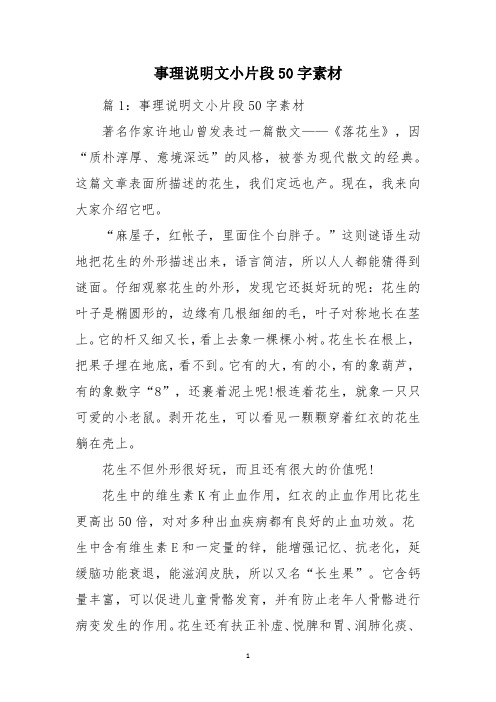
事理说明文小片段50字素材篇1:事理说明文小片段50字素材著名作家许地山曾发表过一篇散文——《落花生》,因“质朴淳厚、意境深远”的风格,被誉为现代散文的经典。
这篇文章表面所描述的花生,我们定远也产。
现在,我来向大家介绍它吧。
“麻屋子,红帐子,里面住个白胖子。
”这则谜语生动地把花生的外形描述出来,语言简洁,所以人人都能猜得到谜面。
仔细观察花生的外形,发现它还挺好玩的呢:花生的叶子是椭圆形的,边缘有几根细细的毛,叶子对称地长在茎上。
它的杆又细又长,看上去象一棵棵小树。
花生长在根上,把果子埋在地底,看不到。
它有的大,有的小,有的象葫芦,有的象数字“8”,还裹着泥土呢!根连着花生,就象一只只可爱的小老鼠。
剥开花生,可以看见一颗颗穿着红衣的花生躺在壳上。
花生不但外形很好玩,而且还有很大的价值呢!花生中的维生素K有止血作用,红衣的止血作用比花生更高出50倍,对对多种出血疾病都有良好的止血功效。
花生中含有维生素E和一定量的锌,能增强记忆、抗老化,延缓脑功能衰退,能滋润皮肤,所以又名“长生果”。
它含钙量丰富,可以促进儿童骨骼发育,并有防止老年人骨骼进行病变发生的作用。
花生还有扶正补虚、悦脾和胃、润肺化痰、利水消肿、止血生乳、清咽止疟等作用。
总之,是妙不可言啊!“麻布衣裳白夹里,大红衬衫裹身体。
白白胖胖一身油,建设国家出力气。
”这则谜语写的是什么?对了,是花生!啊,花生,你真是太讨人喜欢了!篇2:事理说明文小片段50字素材我们家的阳台上,有一盆刺梅,我们一家人都很喜欢它。
刺梅的枝干有七八条,上面长着很多刺,从远处看,象是一条条长长的毛毛虫在使劲的往上爬,似乎上面有什么好吃的在等待着他们。
他的叶子是小小的椭圆形,白天它的叶子是舒展的,圆圆的、绿绿的,就象一片片翡翠;这些叶子多长在枝干的顶端,形成一簇簇,很好看,象在一起分享阳光;到了夜晚,它的叶子就会卷起来,象是睡着了似的。
刺梅是一种很好养的花,因为它非常顽强,无论是严寒酷暑,还是狂风暴雨,它总是坚强的挺立着,即使两个月忘了给他浇水,它也照样能长出新叶子,好象在告诉我:“任何东西都不能阻止我的生长!”。
快餐的危害英文作文
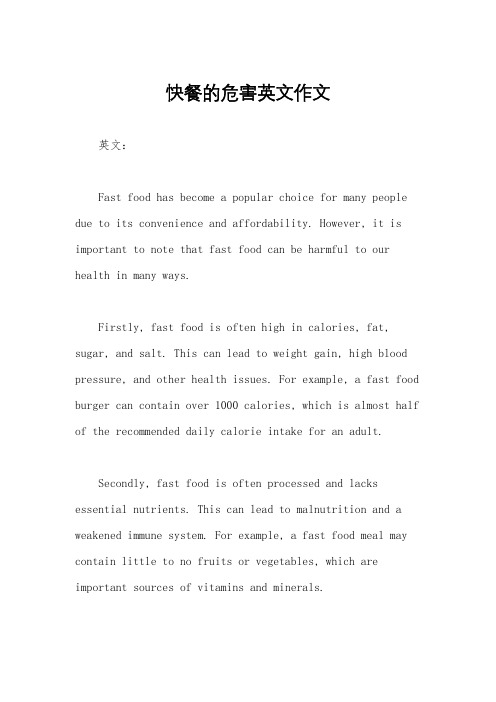
快餐的危害英文作文英文:Fast food has become a popular choice for many people due to its convenience and affordability. However, it is important to note that fast food can be harmful to our health in many ways.Firstly, fast food is often high in calories, fat, sugar, and salt. This can lead to weight gain, high blood pressure, and other health issues. For example, a fast food burger can contain over 1000 calories, which is almost half of the recommended daily calorie intake for an adult.Secondly, fast food is often processed and lacks essential nutrients. This can lead to malnutrition and a weakened immune system. For example, a fast food meal may contain little to no fruits or vegetables, which are important sources of vitamins and minerals.Lastly, fast food can be addictive due to its high levels of sugar, fat, and salt. This can lead to overeating and a dependence on unhealthy foods. For example, I used to eat fast food every day for lunch, but I found myself craving it even when I wasn't hungry.In conclusion, while fast food may be convenient and affordable, it is important to be aware of its potential harm to our health. We should aim to limit our consumption of fast food and instead opt for healthier options.中文:快餐因其方便和价格实惠而成为许多人的首选。
学生在宿舍吃方便面检讨书

您好!我是XX宿舍的XX,今天我怀着愧疚的心情写下这封检讨书,为我在宿舍食用方便面的不当行为向您表示诚挚的歉意。
首先,我要深刻反省自己的错误。
作为一名大学生,我深知宿舍是我们共同生活的家园,是我们学习和休息的重要场所。
然而,近期我因个人习惯和懒惰心理,多次在宿舍内食用方便面,这一行为严重违反了宿舍管理规定,给宿舍环境和同学们的生活带来了诸多不便。
以下是我食用方便面所带来的不良后果:1. 影响宿舍卫生:方便面的包装袋、碗筷等在使用后若不及时清理,会滋生细菌,影响宿舍卫生环境。
2. 噪音干扰:烹饪方便面需要开水,而宿舍内的热水供应有限,频繁使用热水会打扰到其他同学休息。
3. 味道污染:方便面的味道较为浓郁,烹饪过程中产生的油烟和异味会弥漫整个宿舍,影响同学们的嗅觉体验。
4. 安全隐患:在狭小的宿舍空间内烹饪方便面,容易引发火灾等安全事故。
5. 浪费资源:方便面虽然方便快捷,但长期食用不利于身体健康,且不符合节约资源的理念。
针对以上问题,我进行了深刻的自我反省,并制定了以下改正措施:1. 加强自律:严格遵守宿舍管理规定,不再在宿舍内烹饪方便面,养成健康的生活习惯。
2. 提高环保意识:使用环保餐具,减少一次性用品的使用,保护宿舍环境。
3. 关心同学:尊重其他同学的生活习惯,尽量避免产生噪音和异味,共同维护宿舍和谐氛围。
4. 增强安全意识:不在宿舍内进行可能引发火灾等安全事故的行为,确保宿舍安全。
5. 倡导节约:倡导同学们节约用水用电,共同营造节约型宿舍。
我深知,一个人的行为会影响整个宿舍的环境和氛围。
因此,我将以此次事件为鉴,严格要求自己,积极改正错误,争取在今后的生活中做出更好的表现。
再次为我的不当行为向您表示歉意,并恳请您给予我改正错误的机会。
我会以更加饱满的热情投入到学习和生活中,以实际行动弥补此次过失。
此致敬礼!学生:XX日期:XXXX年XX月XX日。
吃泡面检讨书800字

吃泡面检讨书800字我是一位大学生,平时很忙碌,常常没有时间做饭。
因此,泡面成为了我的主要食物之一。
每当饿了,我就会拿出一包泡面,加水泡煮,简单快捷又方便。
但最近,我深感自己对泡面的依赖已经到了一个不可忽视的程度,于是我写下这篇泡面检讨书,自我反省,寻找改变的方法。
首先,我必须承认,我对泡面的依赖已经到了严重的程度。
我每天都要吃上两三包泡面,而且口味几乎都是一样的。
这让我失去了对食物的兴趣和热情。
我甚至都忘记了自己喜欢吃些什么了。
这样的习惯不仅影响了我身体健康,还影响了我的心理健康。
我开始感到自己缺乏生活的乐趣,失去了对日常生活的热情。
其次,我必须深刻认识到泡面作为方便快捷的速食,其中可能存在的潜在危险。
虽然它可以满足我的口腹之欲,但我也不能忽视其中可能隐藏的危害。
首先,泡面中含有大量的调味包,其中高盐分和高油脂含量可能会导致高血压和心血管疾病等健康问题。
而且,泡面中的添加剂和防腐剂也可能对身体健康造成影响。
最后,我意识到必须做出改变。
我决定采取以下措施来减少对泡面的依赖。
1.喜欢烹饪:我准备从现在开始,尝试学习一些烹饪技巧,尽量做一些自己喜欢的菜肴,这样不仅可以满足口腹之欲,还可以享受到做饭的乐趣。
2.寻找其他的食品替代品:我准备尝试一些其他健康的食品,比如水果、蔬菜、瘦肉等等,以减少对泡面的依赖。
3.注意饮食平衡:我准备注意饮食平衡,尽量避免单一的饮食模式,饮食种类多样化;4.适量减少泡面的摄入量:尽管我不能完全放弃泡面,我还是打算适量减少对泡面的依赖,尽量不再把它当作日常的主食。
这些改变不会突然间发生在我身上,我知道这需要时间和毅力的支持。
但我相信,只要我坚持,这些变化将会给我带来健康和快乐。
总的来说,我充分认识到自己对泡面的依赖已经到了很严重的程度,而且这种依赖可能会对我的身体健康和心理健康产生潜在的危害。
因此,我决定采取措施,逐步改善自己的饮食习惯,尽量避免过度依赖泡面。
我相信,只要我有决心和毅力,我一定能够度过这个改变的时间段,找到自己真正喜欢的食物和生活方式。
长期吃方便面的危害有哪些
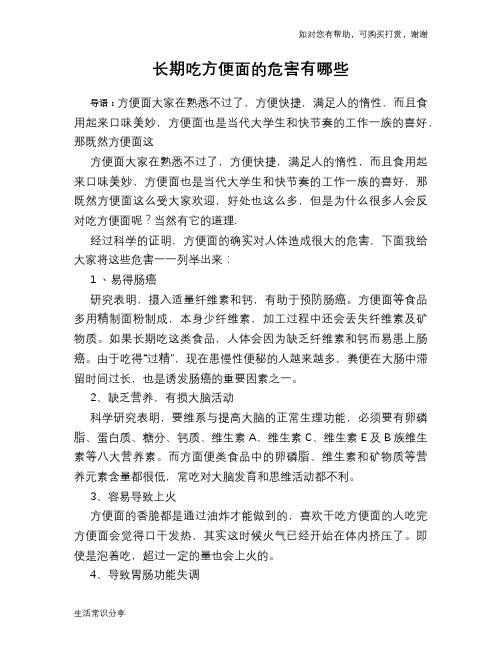
如对您有帮助,可购买打赏,谢谢
生活常识分享长期吃方便面的危害有哪些
导语:方便面大家在熟悉不过了,方便快捷,满足人的惰性,而且食用起来口味美妙,方便面也是当代大学生和快节奏的工作一族的喜好,那既然方便面这
方便面大家在熟悉不过了,方便快捷,满足人的惰性,而且食用起来口味美妙,方便面也是当代大学生和快节奏的工作一族的喜好,那既然方便面这么受大家欢迎,好处也这么多,但是为什么很多人会反对吃方便面呢?当然有它的道理.
经过科学的证明,方便面的确实对人体造成很大的危害,下面我给大家将这些危害一一列举出来:
1丶易得肠癌
研究表明,摄入适量纤维素和钙,有助于预防肠癌。
方便面等食品多用精制面粉制成,本身少纤维素,加工过程中还会丢失纤维素及矿物质。
如果长期吃这类食品,人体会因为缺乏纤维素和钙而易患上肠癌。
由于吃得“过精”,现在患慢性便秘的人越来越多,粪便在大肠中滞留时间过长,也是诱发肠癌的重要因素之一。
2、缺乏营养,有损大脑活动
科学研究表明,要维系与提高大脑的正常生理功能,必须要有卵磷脂、蛋白质、糖分、钙质、维生素A、维生素C、维生素E及B族维生素等八大营养素。
而方面便类食品中的卵磷脂、维生素和矿物质等营养元素含量都很低,常吃对大脑发育和思维活动都不利。
3、容易导致上火
方便面的香脆都是通过油炸才能做到的,喜欢干吃方便面的人吃完方便面会觉得口干发热,其实这时候火气已经开始在体内挤压了。
即使是泡着吃,超过一定的量也会上火的。
高中作文吃方便面的坏处

高中作文吃方便面的坏处【范文一】我相信许多高中生一定和我一样,平常有很多忙到空闲只有一两个小时的时候,而吃方便面成为了很多人的选择。
不过,我认为我们应该了解到方便面的坏处,因为它会影响我们的身体健康。
首先,方便面含有大量的钠离子。
当我们吃进太多钠的时候,容易出现血压升高等不良反应。
其次,方便面中的调味包中通常有很多的防腐剂、色素,这些化学物质对我们的身体造成负面影响。
而且方便面中的脂肪含量也非常高,吃多了容易导致肥胖问题。
当然,吃一两次方便面也应该没什么问题。
但是,如果每天都以它为主食,这对我们的健康将会是致命的。
正常的人体需要不同的营养成分,而方便面无法满足这些需要,长期吃它肯定会对我们的身体产生危害。
因此,作为高中生的我们应该意识到方便面的坏处,尽量避免大量食用。
当然,为了保证身体健康,我们应该尽可能地选择以水果、蔬菜为主的健康饮食。
【要点分析】本文首先提出了吃方便面的普遍现象,引出了方便面的坏处。
在表述坏处时,文章分别从方便面所含钠离子原因、化学物质和脂肪含量三个角度来阐述。
接着作者强调长期大量食用这种方便食品的危害性,并展开论证。
文中调用了一些专业术语和数据,表达了对方便面危害性的深刻认识。
【用词分析】本文用词精确、简练,并专业。
钠离子、防腐剂、脂肪含量等大量健康领域的术语,使文章更具说服性。
且文章语调客观、中性,没有过多地情感色彩,更符合科普性质的文章。
总之,本文用词严谨、精练,文风朴实,语言清晰明了。
【范文二】高中生是学业繁忙,压力较大的群体。
所以,许多同学为了方便,在忙碌的早晨通常都会选择吃方便面。
但是,我们要知道的是,方便面在营养和健康方面是无法和其他食品媲美的。
首先,方便面通常添加较多的调味包,这些调味包中既含大量的化学物质,也含很多的盐和糖分。
而且,方便面本身并不富含营养,大部分情况下只包含淀粉和油,造成了食物营养不平衡。
其次,如果习惯吃方便面的话,你的身体可能会变得容易疲劳、口渴、甚至有胃痛的可能。
晚上在寝室吃泡面检讨书

您好!我是XX班的学生,因近期在寝室晚上食用泡面一事,深感愧疚。
特此写下这篇检讨书,以表达我的悔过之意。
首先,我要对此次事件造成的后果表示深深的歉意。
晚上在寝室食用泡面,不仅违反了学校的纪律规定,还可能对室友的身体健康造成影响。
以下是我对此次事件的反思:一、对学校纪律的漠视我国高等教育法明确规定,学生应当遵守学校纪律,维护校园秩序。
而我在此次事件中,却因为一时的私欲而忽视了学校的规定。
这种行为不仅是对自己不负责任,更是对学校纪律的严重漠视。
在此,我为自己的行为深感懊悔。
二、对室友的不尊重晚上在寝室食用泡面,产生的油烟和气味可能对室友的休息造成干扰。
我意识到,自己的行为对室友的不尊重,给他们带来了不便。
在此,我向室友们表示诚挚的歉意,并承诺今后不再犯类似错误。
三、对自身健康的忽视泡面作为一种方便食品,长期食用可能对身体健康产生不良影响。
我在此次事件中,没有考虑到自己的身体健康,盲目追求方便。
这种行为是对自己不负责任的表现。
今后,我将严格要求自己,注重饮食健康,养成良好的生活习惯。
四、对集体荣誉的损害作为班级的一员,我有责任维护班级的集体荣誉。
而我在此次事件中,因为个人行为给班级带来了负面影响。
我深知,此次事件损害了班级的形象,让我深感愧疚。
在此,我为自己的行为向全班同学表示歉意。
针对以上问题,我提出以下整改措施:1. 严格遵守学校纪律,自觉维护校园秩序。
在今后的学习和生活中,我将时刻提醒自己,遵守学校的各项规定,做一个遵纪守法的好学生。
2. 尊重室友,关心他人。
在寝室生活中,我将更加注意自己的行为,尽量避免对室友造成影响。
同时,我会主动关心室友的生活,帮助他们解决困难。
3. 注重自身健康,养成良好的生活习惯。
我将调整饮食结构,减少泡面的摄入,多吃蔬菜水果,保证营养均衡。
同时,我会加强锻炼,提高身体素质。
4. 发挥集体荣誉感,为班级争光。
在今后的学习和生活中,我将时刻牢记自己的责任,为班级的荣誉而努力。
女生吃方便面的危害晚上睡不着
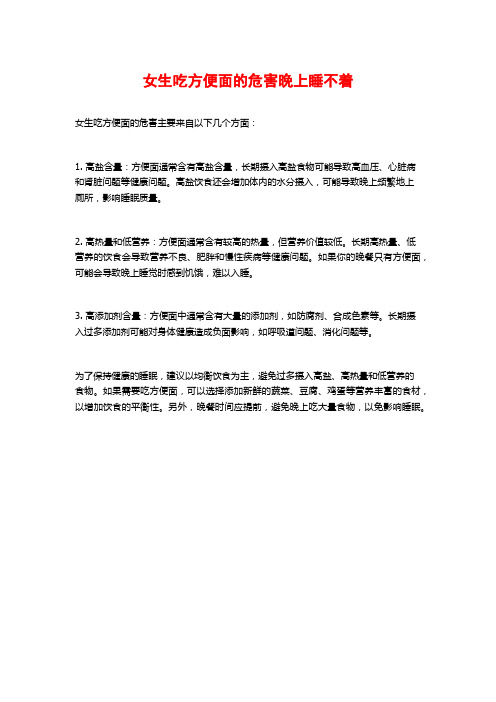
女生吃方便面的危害晚上睡不着
女生吃方便面的危害主要来自以下几个方面:
1. 高盐含量:方便面通常含有高盐含量,长期摄入高盐食物可能导致高血压、心脏病
和肾脏问题等健康问题。
高盐饮食还会增加体内的水分摄入,可能导致晚上频繁地上
厕所,影响睡眠质量。
2. 高热量和低营养:方便面通常含有较高的热量,但营养价值较低。
长期高热量、低
营养的饮食会导致营养不良、肥胖和慢性疾病等健康问题。
如果你的晚餐只有方便面,可能会导致晚上睡觉时感到饥饿,难以入睡。
3. 高添加剂含量:方便面中通常含有大量的添加剂,如防腐剂、合成色素等。
长期摄
入过多添加剂可能对身体健康造成负面影响,如呼吸道问题、消化问题等。
为了保持健康的睡眠,建议以均衡饮食为主,避免过多摄入高盐、高热量和低营养的
食物。
如果需要吃方便面,可以选择添加新鲜的蔬菜、豆腐、鸡蛋等营养丰富的食材,以增加饮食的平衡性。
另外,晚餐时间应提前,避免晚上吃大量食物,以免影响睡眠。
高考英语8月考前突破 阅读理解能力 文化教育 吃方便面会导致心脏病和糖尿病素材

吃方便面会导致心脏病和糖尿病一项研究指出,大学生和省钱达人爱吃的方便面会导致心脏病和糖尿病。
研究发现,每周吃两次或两次以上方便面会增加患心脏代谢综合征的风险,尤其是女性,而患上这一综合症的人,患上严重的心血管疾病和中风的风险也会大大增加。
Holy hotplates! Instant ramen(拉面,面条) noodles, beloved cheap dinner of college kids and budget eaters everywhere, have been linked to heart attacks and diabetes.A study published in the Journal of Nutrition found that the ramen, along with other instant noodle products, may increase a person's risk for cardiometabolic syndrome -- a risk factor for severe cardiovascular disease and stroke -- especially in women."This research is significant since many people are consuming instant noodles without knowing possible health risks," said lead researcher Hyun Joon Shin, MD, in a press release. Shin, a clinical cardiology fellow at Baylor University Medical Center and a nutrition epidemiology(流行病学) doctoral student at the Harvard School of Public Health, could not be reached for further comment.For the study, researchers looked at the data of 10, 711 adults between the ages of 19 and 64, collected via the nationally representative Korean National Health and Nutrition Examination Survey of 2007-2009. They found that eating instant noodles -- ramen, lo mein, glass, Thai, or other -- twice or more a week was associated withcardiometabolic syn drome, a collection of abnormalities affecting the body’s cardiovascular, renal, and metabolic systems.Although the specific cause of the problem was not immediately clear, Shin noted that it might stem from the fact that most instant noodle meals come packaged in Styrofoam, which contains bisphenol A (BPA), a known hormone disruptor -- which is also why women could have been more affected in this study. But the food product contains plenty of unhealthy ingredients, including MSG and the chemical preservative tertiary-butylhydroquinone (TBHQ), and is also high in saturated fat.The study focused on individuals in South Korea, Shin said, as the country has the highest per-capita number of instant noodle consumers in the world, and because, in recent y ears, health problems there, including heart disease and obesity, have been on the rise. But the findings appear to be quite relevant to consumers stateside too, as the United States ranked sixth globally in instant noodle sales, according to the World Instant Noodles Association, which found that the United States accounted for 4,300 billion units sold in 2013 (coming in just behind China, Indonesia, Japan, Vietnam, and India -- and one spot above South Korea, in fact).1。
在学校吃泡面的检讨书怎么写
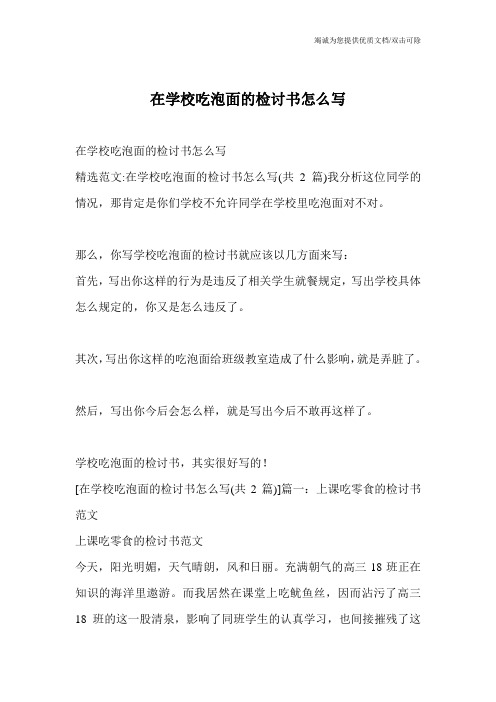
在学校吃泡面的检讨书怎么写在学校吃泡面的检讨书怎么写精选范文:在学校吃泡面的检讨书怎么写(共2篇)我分析这位同学的情况,那肯定是你们学校不允许同学在学校里吃泡面对不对。
那么,你写学校吃泡面的检讨书就应该以几方面来写:首先,写出你这样的行为是违反了相关学生就餐规定,写出学校具体怎么规定的,你又是怎么违反了。
其次,写出你这样的吃泡面给班级教室造成了什么影响,就是弄脏了。
然后,写出你今后会怎么样,就是写出今后不敢再这样了。
学校吃泡面的检讨书,其实很好写的![在学校吃泡面的检讨书怎么写(共2篇)]篇一:上课吃零食的检讨书范文上课吃零食的检讨书范文今天,阳光明媚,天气晴朗,风和日丽。
充满朝气的高三18班正在知识的海洋里遨游。
而我居然在课堂上吃鱿鱼丝,因而沾污了高三18班的这一股清泉,影响了同班学生的认真学习,也间接摧残了这些祖国的花朵们的花瓣,我真的很对不起先祖,很对不起老师,也对不起党,对不起人民,对不起父母,对不起伟大的共和国。
也许我是吃鱿鱼丝发出的香味影响了同学们的思考,这可能延后了他们成为未来科学家的脚步,影响了社会主义国家的未来建设。
而且我毛病特多:好吃懒做,打瞌睡巨响,粗言秽语,通宵[在学校吃泡面的检讨书怎么写(共2篇)]上网,上课吃零食的次数更像天上的繁星,数不胜数。
如果打瞌睡是罪,那我已经犯下滔天罪行,如果迟到是一个错误,我一直在重复着错误,但谢谢你,我亲爱的顾小姐,miss顾,你的宽容大陆令我羞愧万分,你的细心教导让我得到重生,我感谢的泪水可以填满塔里木盆地,我跳动的心可以再次造成汶川大地震,我的浪子回头的决心,超越女娲补天的执著。
感谢顾老师给了我一次重生的机会,只是把警告通知张贴在公告栏,让学生可以监视我,我会努力学习,回报社会,回报学校的,回报共产党,回报中国特色的社会主义的新中国,回报。
最后,还是怀着万分感激的心情,感谢老师给我一次改过自新的机会,让我这样一根枯草可以再次变成祖国的花朵。
吃泡面检讨书1000字

吃泡面检讨书1000字吃泡面检讨书最近,我突然想起过去常常吃方便面的日子,感觉有些内疚和遗憾。
那个时候,由于工作的繁忙和生活的不规律,泡面成了我的日常晚餐。
每天只管解决温饱,却忽略了对身体健康的负面影响。
因此,我决定写下这篇检讨书,反思并纠正我过去不良的饮食习惯。
首先,我得承认方便面虽然方便,但并不是一种均衡的饮食。
泡面的主要成分是淀粉质,而缺乏蛋白质、蔬菜和水果的摄入。
长期以来,我没有意识到这种不平衡饮食的危害,直到近来才逐渐意识到这一问题。
不仅仅是缺乏营养素,方便面中也添加了许多防腐剂和调味剂,对身体健康也会带来一定的负面影响。
其次,我也意识到方便面中的高盐含量对身体健康造成的威胁。
食用过多的盐会导致水肿、高血压等健康问题。
饮食不均衡的同时,再加上这种高盐摄入,对我的身体健康造成了极为不利的影响。
而且,我认识到方便面中还存在一些化学添加剂,对肾脏健康也会产生潜在威胁。
这使我深感后悔,以往为了省事而造成的饮食问题,如今责任重大,需要我认真面对。
不仅如此,我吃泡面所造成的不良影响还不仅仅局限于身体健康。
方便面的加工过程中会产生大量的包装垃圾,对环境产生一定的破坏。
我曾经过早就敢在这一事实上,没有认真思考对环境造成的负担。
这也是我在写下这篇检讨书时内心内疚的原因之一。
我期望自己在饮食习惯上能够做出改变,并积极参与环保活动,为环境做出自己的贡献。
然而,反思过去,我也认识到问题的根源并不在于方便面本身,而是在于我的懒惰和缺乏时间管理的能力。
方便面之所以成为我的主食,并非因为它的美味和满足感,而是因为它的便利和节省时间的优势。
事实上,我也了解到健康饮食并不一定需要花费大量的时间和精力。
只要合理安排时间,合理选择食材,健康饮食也可以变得方便和快捷。
为了纠正过去的错误,我制定了一系列的饮食改变计划。
首先,我将遵循膳食均衡的原则,保证摄入蛋白质、蔬菜和水果等各种营养素。
特别是增加蔬菜和水果的摄入,以保证维生素和纤维的摄入量。
吃方便面的危害英语作文

吃方便面的危害英语作文Title: The Hazards of Instant Noodles。
Instant noodles, while convenient, pose significant health risks that are often overlooked. In this essay, wewill delve into the detrimental effects of consuminginstant noodles on our health.First and foremost, instant noodles are notorious for their high sodium content. Excessive sodium intake can lead to hypertension, heart disease, and stroke. According to health experts, a single serving of instant noodles can contain up to 60% of the recommended daily intake of sodium. This overconsumption of sodium not only poses immediate health risks but also contributes to long-term health complications.Moreover, instant noodles are laden with unhealthy fats, particularly saturated and trans fats. These fats can elevate cholesterol levels in the blood, increasing therisk of cardiovascular diseases such as atherosclerosis and heart attacks. Regular consumption of instant noodles can thus have a detrimental impact on heart health.In addition to their high sodium and fat content, instant noodles lack essential nutrients that are vital for our overall well-being. While they may provide a quick and filling meal, they are deficient in important nutrients such as vitamins, minerals, and dietary fiber. Relying on instant noodles as a staple food can result in nutritional deficiencies and weaken the immune system, making individuals more susceptible to illnesses.Furthermore, the manufacturing process of instant noodles involves the use of various additives and preservatives to enhance flavor and prolong shelf life. These additives, including monosodium glutamate (MSG) and tertiary butylhydroquinone (TBHQ), have been linked to adverse health effects ranging from headaches and dizziness to more severe conditions like cancer and organ damage. Consuming instant noodles regularly exposes individuals to these harmful chemicals, jeopardizing their health in thelong run.Another concerning aspect of instant noodles is their potential impact on weight management and obesity. Despite being low in calories, instant noodles are highly processed and lack nutritional value, leaving consumers feeling unsatisfied and prone to overeating. Moreover, the high glycemic index of instant noodles can cause rapid spikes in blood sugar levels, leading to increased hunger and cravings for unhealthy foods. Over time, this cancontribute to weight gain and obesity, along with associated health complications such as diabetes and metabolic syndrome.In conclusion, while instant noodles offer convenience and affordability, their consumption comes with significant health risks. From their high sodium and fat content to their lack of essential nutrients and the presence of harmful additives, instant noodles can have a detrimental impact on our health and well-being. It is imperative to limit the intake of instant noodles and opt for healthier alternatives to safeguard our health in the long term.。
方便面缺点英语作文

方便面缺点英语作文Title: Drawbacks of Instant Noodles。
Instant noodles, ubiquitous in many households worldwide, offer convenience and a quick meal solution. However, beneath their popularity lies a range of disadvantages that warrant consideration. This essay explores the drawbacks of instant noodles, shedding light on their adverse effects on health, the environment, and social dynamics.First and foremost, one significant disadvantage of instant noodles is their poor nutritional value. Typically high in sodium, unhealthy fats, and low in essential nutrients such as vitamins, minerals, and fiber, regular consumption can contribute to various health problems. Excessive sodium intake is linked to hypertension and cardiovascular diseases, while the lack of essential nutrients may lead to malnutrition and other health issues in the long term.Moreover, the production process of instant noodlesoften involves harmful additives and preservatives to enhance flavor and prolong shelf life. These additives,such as monosodium glutamate (MSG) and artificial colorings, have been associated with adverse health effects ranging from allergic reactions to neurological disorders. Furthermore, the packaging of instant noodles, usually made from non-biodegradable materials like plastic, contributesto environmental pollution and waste accumulation.Another drawback of instant noodles is their affordability, which often leads to their overconsumption, especially among low-income populations. While they may seem like a cost-effective meal option, the long-term consequences of poor dietary choices outweigh the short-term financial savings. Health complications resulting from regular consumption of instant noodles can lead toincreased healthcare costs and reduced productivity, ultimately exacerbating socioeconomic inequalities.Furthermore, the convenience of instant noodlespromotes a sedentary lifestyle and undermines traditional cooking practices, fostering a disconnect betweenindividuals and their food. The ease of preparation and availability of instant noodles discourage people from engaging in meal planning, cooking from scratch, and consuming fresh, wholesome ingredients. This shift towards processed and convenience foods diminishes culinary skills, cultural heritage, and the communal aspect of sharing meals with family and friends.Socially, the widespread consumption of instant noodles reflects broader trends of globalization and homogenization of diets. As traditional culinary practices are replaced by mass-produced, standardized food products, culturaldiversity and culinary heritage are at risk of being eroded. Moreover, the marketing and advertising strategies employed by multinational food corporations perpetuate unrealistic beauty standards and unhealthy eating habits, particularly among impressionable youth.In conclusion, while instant noodles offer convenience and affordability, their drawbacks cannot be overlooked.From their poor nutritional value and harmful additives to their environmental impact and erosion of culinary traditions, instant noodles pose significant challenges to public health, the environment, and social well-being. As consumers, it is essential to be mindful of the choices we make and strive for a balanced diet that prioritizes health, sustainability, and cultural diversity.。
吃快餐的坏处 英文作文

吃快餐的坏处英文作文Title: The Adverse Effects of Fast Food Consumption。
Introduction:Fast food has become a ubiquitous part of modern life, offering convenience and affordability to consumers around the globe. However, beneath its appealing facade lie numerous detrimental effects on our health and well-being. This essay aims to explore the various negative consequences associated with the consumption of fast food.Health Risks:One of the most significant drawbacks of fast food consumption is its detrimental impact on health. These foods are often high in calories, saturated fats, sugars, and sodium, contributing to obesity, cardiovascular diseases, and diabetes. Regular consumption of fast food has been linked to an increased risk of obesity due to itshigh energy density and low nutritional value.Nutritional Deficiencies:Fast food is notorious for its poor nutritional quality. It typically lacks essential nutrients such as vitamins, minerals, and dietary fiber, which are crucial for maintaining overall health. A diet predominantly consisting of fast food can lead to nutritional deficiencies,impairing bodily functions and increasing thesusceptibility to various diseases.Metabolic Syndrome:Metabolic syndrome, characterized by a cluster of conditions including high blood pressure, elevated blood sugar levels, abnormal cholesterol levels, and excess abdominal fat, is closely associated with the consumptionof fast food. The excessive intake of refined carbohydrates and unhealthy fats found in fast food contributes toinsulin resistance and metabolic dysfunction, paving theway for the development of metabolic syndrome.Digestive Issues:Fast food is often processed and laden with artificial additives, preservatives, and flavor enhancers to improve taste and prolong shelf life. These additives, along with the high fat and low fiber content of fast food, candisrupt the normal functioning of the digestive system, leading to gastrointestinal problems such as indigestion, bloating, constipation, and irritable bowel syndrome.Mental Health Implications:While the adverse effects of fast food on physical health are well-documented, its impact on mental health is often overlooked. Research suggests a link between fast food consumption and an increased risk of depression and anxiety. The consumption of foods high in trans fats and refined sugars, commonly found in fast food, may exacerbate inflammation in the brain and negatively affect neurotransmitter function, thereby influencing mood and mental well-being.Environmental Consequences:Beyond its impact on human health, the fast foodindustry also poses significant environmental challenges. The production of fast food ingredients, particularly meat and dairy products, contributes to deforestation, greenhouse gas emissions, and water pollution. Additionally, the excessive packaging and waste generated by fast food consumption further exacerbate environmental degradation, contributing to issues such as plastic pollution and resource depletion.Conclusion:In conclusion, while fast food may offer convenienceand affordability, its consumption comes with a plethora of adverse effects on health, ranging from obesity and metabolic disorders to digestive issues and mental health implications. Moreover, the environmental consequences ofthe fast food industry cannot be ignored. Therefore, it is imperative to make informed dietary choices and prioritizewhole, nutrient-rich foods for the betterment of both personal health and the environment.。
快餐对我们的生活有什么坏处英语作文
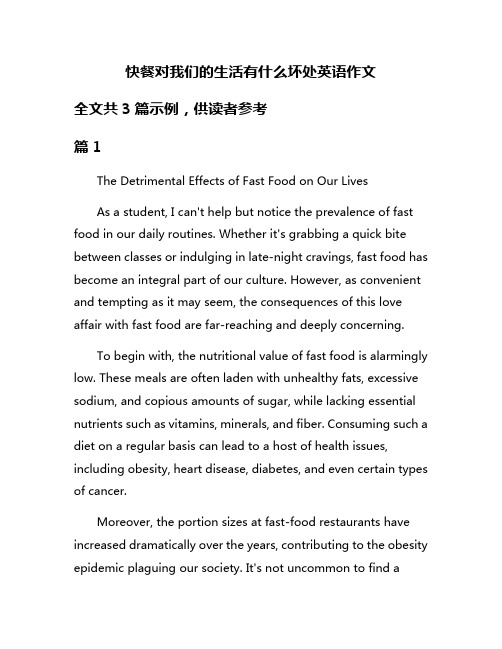
快餐对我们的生活有什么坏处英语作文全文共3篇示例,供读者参考篇1The Detrimental Effects of Fast Food on Our LivesAs a student, I can't help but notice the prevalence of fast food in our daily routines. Whether it's grabbing a quick bite between classes or indulging in late-night cravings, fast food has become an integral part of our culture. However, as convenient and tempting as it may seem, the consequences of this love affair with fast food are far-reaching and deeply concerning.To begin with, the nutritional value of fast food is alarmingly low. These meals are often laden with unhealthy fats, excessive sodium, and copious amounts of sugar, while lacking essential nutrients such as vitamins, minerals, and fiber. Consuming such a diet on a regular basis can lead to a host of health issues, including obesity, heart disease, diabetes, and even certain types of cancer.Moreover, the portion sizes at fast-food restaurants have increased dramatically over the years, contributing to the obesity epidemic plaguing our society. It's not uncommon to find asingle meal that exceeds the recommended daily caloric intake, leaving us feeling sluggish and lethargic after consumption.Beyond the physical consequences, fast food also takes a toll on our mental well-being. The guilt and shame associated with indulging in unhealthy choices can lead to feelings of lowself-esteem and negative body image, particularly among young people who are bombarded with unrealistic beauty standards.Furthermore, the environmental impact of the fast-food industry cannot be ignored. The production and transportation of these meals contribute significantly to greenhouse gas emissions, water pollution, and deforestation. The excessive use of single-use plastics and styrofoam containers exacerbates the already alarming levels of waste in our landfills and oceans.From a financial perspective, the true cost of fast food extends beyond the price on the menu. The long-term medical expenses associated with diet-related illnesses can be staggering, placing a burden on both individuals and the healthcare system as a whole.Despite these numerous drawbacks, the allure of fast food remains strong, largely due to aggressive marketing tactics and the convenience factor. Fast-food chains have become masters at targeting vulnerable populations, including children andlow-income communities, where access to healthy alternatives may be limited.As students, we are particularly susceptible to the temptations of fast food. With hectic schedules, limited budgets, and the desire for instant gratification, it's easy to fall into the trap of relying on these quick and inexpensive meal options. However, it's crucial that we educate ourselves on the consequences and make informed decisions about our dietary choices.Fortunately, there are alternatives to fast food that can satisfy our cravings without compromising our health or the well-being of our planet. Preparing meals at home using fresh, whole ingredients not only provides better nutritional value but also promotes mindful eating habits and a deeper appreciation for the food we consume.Additionally, many colleges and universities have recognized the importance of offering healthier options on campus, such as salad bars, fruit stands, and vegetarian/vegan options. By supporting these initiatives, we can collectively encourage a shift towards more sustainable and nutritious dining choices.In conclusion, while fast food may offer temporary convenience and satisfaction, the long-term consequences onour physical health, mental well-being, financial stability, and the environment are too grave to ignore. As students and future leaders, it is our responsibility to break free from the cycle of fast-food dependency and embrace a lifestyle that prioritizes wholesome nutrition, moderation, and environmental consciousness. By making conscious choices today, we can pave the way for a healthier, more sustainable future for ourselves and generations to come.篇2The Detrimental Effects of Fast Food on Our LivesAs students, we are constantly bombarded with advertisements and promotions for fast food. It's cheap, it's convenient, and it tastes pretty good. But have we ever stopped to think about the negative impacts that fast food can have on our lives? From our health to our finances to the environment, our reliance on fast food is taking a serious toll. In this essay, I will explore the various ways in which fast food is detrimental to our wellbeing as students and human beings.Perhaps the most obvious issue with fast food is its impact on our physical health. The meals served at fast food restaurants are typically high in calories, saturated fats, sodium, and addedsugars – a combination that can lead to weight gain, obesity, heart disease, and other chronic health problems. The overconsumption of these unhealthy ingredients has been linked to an increased risk of type 2 diabetes, certain types of cancer, and other serious illnesses.Portion sizes at fast food restaurants have also grown considerably over the years, making it easy to consume far more calories than our bodies require in a single meal. A seemingly innocent burger, fries, and soda combo can easily exceed 1,000 calories – nearly half of the recommended daily calorie intake for many adults. And let's not forget about the addictive nature of fast food, with its perfect balance of salt, sugar, and fat that keeps us craving more.Beyond the immediate health concerns, a diet high in fast food can also have long-term consequences. Studies have shown that individuals who frequently consume fast food are at a higher risk of developing depression, anxiety, and other mental health issues. The lack of essential nutrients and the presence of harmful additives in fast food can negatively impact our brain function, mood, and overall wellbeing.Another significant issue with fast food is its impact on our finances. While it may seem like a cheap option in the short term,the costs of regularly eating fast food can add up quickly. Not only are we spending money on the meals themselves, but we are also likely to incur additional expenses in the form of medical bills and healthcare costs due to the negative health effects associated with a fast food diet.As students, many of us are already struggling with limited budgets and student loan debt. Spending a significant portion of our income on fast food can further exacerbate financial strain and make it more difficult to save for important goals, such as paying off loans or saving for a down payment on a home.Moreover, the convenience of fast food often comes at the expense of environmental sustainability. The fast food industry is a major contributor to greenhouse gas emissions, deforestation, and water pollution. The production of meat and dairy products used in fast food items has a substantial carbon footprint, and the packaging used for fast food meals generates a significant amount of waste that ends up in landfills or polluting our oceans.Additionally, many fast food chains source their ingredients from industrial agricultural operations that rely heavily on pesticides, hormones, and unsustainable farming practices. These practices can have devastating impacts on local ecosystems, biodiversity, and the long-term health of our planet.As students, we have a responsibility to be mindful of our impact on the environment and to make choices that align with our values and principles. By reducing our consumption of fast food, we can help mitigate the environmental damage caused by this industry and support more sustainable and ethical food production practices.Beyond the health, financial, and environmental concerns, our reliance on fast food can also have societal implications. The proliferation of fast food restaurants, particularly in low-income and underserved communities, has contributed to the creation of "food deserts" – areas where access to fresh, nutritious foods is limited or non-existent.This lack of access to healthy food options can perpetuate cycles of poor health and poverty, as individuals in these communities are forced to rely on the readily available, but nutritionally deficient, fast food options. The fast food industry has also been criticized for exploiting low-wage workers, perpetuating unfair labor practices, and contributing to income inequality.As students, we should be aware of these broader societal impacts and strive to support businesses and industries thatprioritize ethical practices, fair labor standards, and access to healthy food for all.Despite the many negative effects of fast food, it's important to acknowledge that for some individuals and families, fast food may be the only accessible or affordable option due to various socioeconomic factors. Rather than placing blame or judgment, we should strive to create systemic changes that increase access to affordable, nutritious food options and promote better education about healthy eating habits.In conclusion, while fast food may be convenient and tempting, its negative impacts on our health, finances, the environment, and society as a whole cannot be ignored. As students, we have the power to make conscious choices about what we consume and to prioritize our wellbeing and the wellbeing of our communities.By reducing our reliance on fast food and supporting more sustainable and ethical food production practices, we can not only improve our own lives but also contribute to creating a healthier and more equitable world for future generations. It's time for us to recognize the true cost of fast food and to make decisions that align with our values and our commitment to living a fulfilling and responsible life.篇3The Negative Effects of Fast Food on Our LivesFast food is everywhere these days. You can't drive down the street without passing a McDonald's, Burger King, KFC or some other chain restaurant advertising cheap, convenient meals. With heavy marketing, cheap prices, and a modern lifestyle that keeps us all rushed off our feet, it's no wonder fast food has become so popular. But is this culture of fast food doing us more harm than good? In my opinion, the negatives of fast food far outweigh any positives.The first major issue with fast food is the negative health impacts. Fast foods are typically loaded with things that are bad for our bodies - excessive amounts of sodium, saturated fats, sugars and artificial ingredients. All the grease, salt and lack of nutrients in a diet heavy on burgers, fries, shakes and fried chicken takes a major toll. Eating too much of it leads to weight gain, obesity, heart disease, diabetes and other harmful conditions.I know plenty of students, myself included, who have gotten into the bad habit of hitting the drive-thru regularly because fast food is cheap and convenient when you're rushed. But over time,a fast food diet like that catches up with you. Studies have shown that youngpeople who eat a lot of fast food are at higher risk of developing obesity and other health problems earlier in life. I can't count how many times I've felt sluggish or weighted down after eating some greasy burger and fries. Our bodies just aren't designed to digest that slop regularly.The proliferation of fast food is also having a negative impact on the environment and animal welfare. The mass production of beef, chicken and other meats by the fast food industry leads to high levels of animal cruelty on factory farms. Not to mention the significant carbon footprint created by getting all those burgers from the farm to the restaurant. The energy, resources and emissions required are simply unsustainable long-term.Then there are all the packaging wastes created by fast food - all those sandwich wrappers, boxes, cups and bags. So much unnecessary trash with a huge environmental impact. To make matters worse, a lot of fast food packaging isn't easily recyclable or biodegradable due to the materials and processes involved. It's like an environmental nightmare fueled by our laziness and obsession with instant gratification.Beyond the health and environmental tolls, fast food culture is also taking an economic toll. So much money is being wasted on low-quality, unhealthy foods that don't benefit our bodies or local economies. The profits get funneled away to some corporate HQ rather than staying in our local communities. People are sacrificing their hard-earned money for empty, fleeting satisfaction. It would be far better if that money went towards local restaurants employing community members and using fresh, healthy ingredients.When you look at the big picture, fast food is having an undeniably negative impact on our individual lives and society as a whole. Now I'm not saying fast food can never be consumed - I still enjoy the occasional greasy indulgence. But it should be exactly that, an occasional treat rather than a dietary staple. The habits enabled by fast food are undercutting our health, wreaking havoc on the environment, draining local economies and conditioning us towards unhealthy behaviors of sloth and gluttony.As students and citizens, we owe it to ourselves, our communities and future generations to move away from our over-reliance on fast food towards a more sustainable and beneficial way of life. It starts with increased education aboutnutrition, cooking skills and having more self-discipline to make healthier choices. Small steps towards cutting back on fast food intake can pay huge dividends for our long-term physical and mental well-being. We need to value ourselves and this planet more than the empty calories and cheap gratification of a greasy drive-thru meal.Fast food may seem cheap, quick and tasty in the moment. But in the grand scheme of things, it's costs far outweigh any fleeting benefits. The negative impacts are wide-ranging and the future consequences of enabling these habits too high to ignore. As young people, it's our responsibility to be the catalysts for changing this unhealthy aspect of modern culture. The first step is admitting we have a fast food problem. The next is consciously changing our behaviors and routines to cut back on this unhealthy obsession. It's a difficult challenge given how convenient and tasty these foods can seem. But our long-term health, the environment, and the well-being of society depends on it. We can and must do better than succumbing to the salty, fatty temptations of the Dollar Menu.。
校园吃泡面检讨书

校园吃泡面检讨书这是一次十分深刻的检查,我对于我这次犯的错误感到很惭愧,我真的不应该不重视老师说的话,我不应该违背老师的话,我们作为学生就应该完全的听从老师的话,而我这次没有很好的重视到老师讲的话。
我感到很抱歉,我希望老师可以原谅我的错误,我这次的悔过真的很深刻。
不过,人总是会犯错误的,当然我知道也不能以此作为借口,我们还是要尽量的避免这样的错误发生,希望老师可以相信我的悔过之心。
“人有失手,马有失蹄”。
我的不良行为不是向老师的纪律进行挑战。
绝对是失误,老师说的话很正确,就是想要犯错误也不应该再您的面前犯错误,我感到真的是很惭愧,怎么可以这么的.我真的是很深刻的认识到了我的错误,知道了老师说的话不能够装做没有听见,老师说的话就要听从,老师说的话也绝对会实现她的诺言,老师所要管的一定是为了我们学生好,所以我们不用挑战老师的纪律,我们还是学生,没有能力对老师说出来的话产生不听从的想法,我们学生唯一可以做的事情就是好好的听从老师的话,好好的学习好,让老师可以放心,让老师可以信任。
这次的事件我真的感到抱歉,希望老师可以原谅我,可以认可我认错的态度,我真的已经深刻的反省到我的错误了,希望老师再给我知错就改的机会。
也希望同学也要引以为戒,不要犯和我一样愚蠢的错误了,这次的教训真的很大很大今天把方便面带到教室吃被发现了。
怎么写检讨书。
一点字就行了。
今天我方便面带到教室,而且没有遵守课堂秩序,上课吃东西,我已经深刻意识到了自己这么做是不对的,因为这样做,既影响同学学习也影响老师授课,我接受老师的批评,并且保证下次不会再犯,希望老师原谅我,我接受老师和其他同学的监督。
谢谢老师宿舍吃泡面检讨书五百字告诉他老子吃什么关你毛事又没吃你的老子想在那就在那吃宿舍又不是你家的关于在班里吃方便面而被罚写的检讨书(500多字)下面提供一篇范文参考对不起,老师!我犯的是一个严重的原则性的问题。
我知道,老师对于我的犯校规也非常的生气。
每天吃泡面的危害

每天吃泡面的危害每天吃泡面的危害由于方便面等干脆食品、炸鸡、炸土豆片等中含有较多调味剂及添加剂,经常食用会使人味觉迟钝,影响正常食欲。
下面是我为大家精心挑选的,希望对大家有所帮助。
1、有损大脑活动市场调研显示,方面便类食品中维生素和矿物质都很低,常吃对大脑发育和思维活动都不利。
英国营养品协会通过研究认为,多吃快餐会损害大脑功能,引起正常思维的紊乱。
还发现,吃快餐太多的儿童,常会出现精神不集中、烦躁不安等症状,严重的还会产生好斗等现象。
2、引起多种文明病方便面的危害很大,经常吃会因过多摄入脂肪和钠而易罹患心脏病、高血压病、肥胖及糖尿病等,尤其是幼儿的肾脏还没有发育到成熟阶段,无力排出血液中过多的钠,如果经常吃这类食品,患病的几率会更大。
3、易得肠癌方便面等食品多用精制面粉制成,本身少纤维素,加工过程中还会丢失纤维素及矿物质。
如果长期吃这类食品,人体会因缺乏纤维素和钙而易患上肠癌。
由于吃得“过精”,现在患慢性便秘的人越来越多,粪便在大肠中滞留时间过长,也是诱发肠癌的重要因素之一。
减少对身体的危害1.第一碗水要倒掉很多方便面表面都有蜡层,对身体不好,吃之前最好用温水泡一泡。
还会将一部分油脂和食盐析出来,所以倒掉可以减少二者的摄入量。
2.加点青菜和瘦肉因为方便面很少有丰富的膳食纤维和足够的蛋白质,所以加一些蔬菜和瘦肉可以改善这个问题,使营养更均衡。
3.料包酱包要减半放料包的时候尽量放一半即可,为了增强口感,料包的含盐量都比较高,所以一般情况下放一半就足够满足我们的需求了。
4.面汤味美但别喝不少人有喝方便面面汤的习惯,甚至吃完面后一饮而尽。
煮完泡完的面汤虽然味道鲜美,但是方便面汤中的主要成分为食盐、白砂糖、甜蜜素、柠檬酸、肉类香精等多种食品添加剂,对人体健康并没好处,所以把面汤都倒掉比较好。
方便面的新奇吃法1、家常炒面原料:方便面1包,猪瘦肉20克、火腿肠1根、红尖椒1个、香菇2个、榨菜1包。
调料:酱油适量,方便面调味料。
- 1、下载文档前请自行甄别文档内容的完整性,平台不提供额外的编辑、内容补充、找答案等附加服务。
- 2、"仅部分预览"的文档,不可在线预览部分如存在完整性等问题,可反馈申请退款(可完整预览的文档不适用该条件!)。
- 3、如文档侵犯您的权益,请联系客服反馈,我们会尽快为您处理(人工客服工作时间:9:00-18:30)。
高中作文--吃方便面的坏处
方便面里的食品添加剂分别起着增色、漂白、调节胃口、防止氧化、延长保存期等多种作用,这些食品添加剂按规定都是可以使用的。
因此,偶尔吃方便面是无关紧要的。
但是,一些人经常拿来当早餐或懒得下厨房时把它当饭吃,更有甚者长年累月吃方便面,这就有碍身体健康了。
油脂:为了延长保存期,大多数品种的方便面都用油炸过,油脂经过氧化后变成氧化脂质。
它积存于血管或其他器官中,形成老化现象,加速人的老化速度,引起动脉硬化,易导致脑溢血、心脏病、肾脏病等疾病。
食盐:一包方便面含盐约6克,而一个人一天食盐的摄取量以6克为宜,所以方便面含盐量明显偏高。
经常吃方便面会因摄入食盐过多而易患高血压,且损害肾脏。
磷酸盐:磷酸盐添加剂可以改善方便面的味道。
但是,人体摄磷太多会使体内的钙无法充分吸收、利用,容易引起骨折、牙齿脱落和骨骼变形。
防氧化剂:方便面从制成到消费者,短时为一两个月,长时竟达一两年,其中添加的防氧化剂和其他化学药品因长期贮存,受环境影响,已经在慢慢变质,食后对人体有一定的害处。
为此,有关专家建议最好少吃方便面。
为了防止和降低方便面对人体的危害,吃方便面时,将泡方便面的汤倒掉,再兑上开水或别的汤,以减少其中的盐及其他有害物质。
另外,吃方便面时可加些含维
生素丰富的蔬菜,如菠菜、青椒等,以便冲淡各种添加剂对人体的危害。
